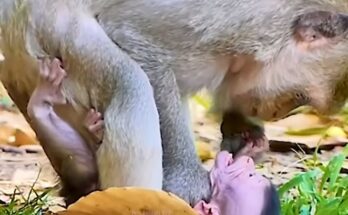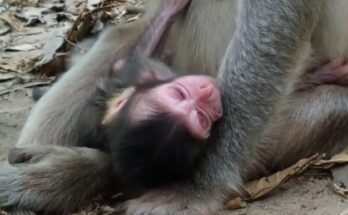In the dense canopy of a tropical rainforest, an aging monkey mother faces a challenging transition—one that is both natural and necessary. Her infant, still clinging tightly to her fur, resists the change that must come. She is trying to wean him, but he refuses to let go.
Weaning is a difficult process in primates, particularly for older mothers. As she ages, her energy reserves decline, and lactation becomes more taxing. Her body is no longer as strong as it once was, and every feeding session drains her more than before. Still, her maternal instincts are strong. She has nourished and protected her baby from the moment he was born, but now she must push him toward independence.
At first, her attempts are gentle. She moves away when he tries to nurse, distracting him with play or offering bits of fruit instead. But he protests, screeching and reaching for her. When she sits still, he scrambles up her chest, latching onto her nipple with urgency. She allows it for a moment, her instincts warring with her exhaustion, before she pries him off again.
The infant does not understand why his mother is denying him the comfort he has always known. He whimpers, clings tighter, and throws tantrums. But the mother knows that this stage is inevitable. She must teach him to rely on solid food, to explore on his own, and to gain the independence needed to survive within their social group.
Other members of their troop observe the struggle with indifference, familiarity, or even mild amusement. Older females have been through this before. They know that weaning is often an emotional and physical battle. Some younger mothers, still nursing their own infants, watch with sympathy. Soon enough, they will face the same challenge.
The aging mother starts to enforce her boundaries more firmly. She pushes the infant away when he tries to nurse. She moves quickly, making it difficult for him to latch on. When he persists, she bares her teeth and issues a warning grunt. He recoils, momentarily shocked. For the first time, his mother—his source of warmth and security—has shown aggression toward him.
Confused and distressed, he sulks nearby, occasionally looking back at her with wide, pleading eyes. She does not relent. Instead, she busies herself with grooming or foraging, showing him that there are other ways to find comfort and sustenance.
Over the next few days, the infant’s resistance weakens. Hunger pushes him to accept the solid foods she offers. He spends more time playing with other young monkeys, gradually gaining confidence in his independence. The nursing sessions become less frequent, until one day, they stop altogether.
The mother watches her child from a short distance, her body relieved of the constant demand, but her heart still tethered by the bond they share. She has done her job. He is growing, learning, and taking his first steps into self-reliance. Though he no longer nurses, he still finds comfort in her presence—just in a new way.


